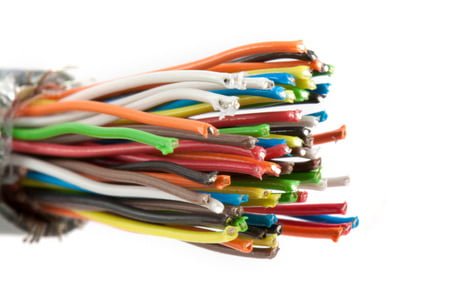- Kabel rənglərinin dekodlanması və onların əhəmiyyəti
- Kabel Rəng Standartlarını Anlamaq
- Ethernet kabelinin rənglərinin deşifrə edilməsi
- Ethernet Kabel Rənglərinin Tərcüməsi
- Cat6 Kabel Rənglərində Naviqasiya
- Şəbəkə Kabel Rəng Diaqramı
- Xüsusi Kabel Montaj Həlləri
- pulsuz nümunə əldə etmək üçün bizimlə əlaqə saxlayın
Kabel rənglərinin dekodlanması və onların əhəmiyyəti
Tel və kabel rəng kodlarına gəldikdə, ümumi bir sual sənaye standartının olub-olmamasıdır. Elektrik və Elektronika Mühəndisləri İnstitutu kimi təşkilatlar isə (IEEE) bəzi təlimatlar təklif edin, ümumi qəbul edilmiş standart yoxdur. Əvəzində, özəl sənayelər, xüsusilə telekommunikasiya, standartlaşdırma səylərində liderlik edir.

Kabel Rəng Standartlarını Anlamaq
Kabel rəng standartlarının sənayelər və hətta ölkələr arasında geniş şəkildə fərqləndiyini qəbul etmək çox vacibdir. Məsələn, Smartfonların tətbiqi ilə əlaqədar telekommunikasiya bumu 2007 müxtəlif tətbiqetmə vaxtlarını əks etdirən müxtəlif rəng sxemlərinə səbəb oldu.
Üstəlik, Qlobal Təchizat Zəncirləri, şirkətlərin müxtəlif ölkələrdən olan kabellər olduğunu bildirir, hər biri öz rəngli konvensiyaları ilə. IEEE-dən rəhbərliyə baxmayaraq, Telekommunikasiya Sənayesi Birliyi (Tia), və başqaları, Həqiqi standartlaşdırma qaçırılır.
Ethernet kabelinin rənglərinin deşifrə edilməsi
Ethernet kabelləri, kompüter şəbəkəsində yerli, müxtəlif rənglərdə gəlin, Ancaq heç bir rəng üstün performansını göstərir. Əvəzində, Rənglər tez-tez xüsusi tətbiqləri göstərir. Boz kimi ümumi rənglər, mavi, sarı, portağal, və ağ üstünlük təşkil edir, açıq istifadə üçün qara rəngdə qorunur.
Ethernet Kabel Rənglərinin Tərcüməsi
Ethernet kabel rənglərinin mənası kontekstə görə dəyişə bilər. Məsələn, Müdafiə şöbəsi (Dul) Məlumatların məxfiliyini təsnif etmək üçün fərqli rənglər işləyir: Ən yaxşı sirr üçün sarı, orta səviyyə üçün qırmızı, və təsnif olunmamış məlumatlar üçün mavi.
Başqası üzərində bir rəng diktə etməsi olmadıqda, müəyyən nümunələr ortaya çıxır:
- Boz ethernet: Adətən standart ethernet əlaqələrini təmsil edir.
- Yaşıl ethernet: Müxtəlif cihazları birbaşa əlaqələndirmək üçün bir krossover bağlantısını göstərir.
- Sarı Ethernet: Ethernet üzərində güc üçün qorunur (PoE) hərf, Ethernet kabelləri vasitəsilə güc çatdırmaq üçün IEEE tərəfindən qurulmuşdur.
- Mavi ethernet: Tez-tez terminal server əlaqələri üçün istifadə olunur, Bir modem olmadan bir LAN-a birdən çox sistem əlaqəsini asanlaşdırmaq.
- Yamaq kabel rəng standartları
ANSI / TIA patch kabel rəng standartlarını dərc edərkən, Universal övladlığa götürmə qaçırılır. Bəzi qurumlar, Wisconsin Network Services şöbəsi kimi, Rəng standartlarını daxili təyin edin. Məsələn:
- Boz: Standard Ethernet bağlantıları
- Yaşıl: Krossover Ethernet əlaqələri
- Sarı: Poe əlaqələri
- Portağal: Analoq olmayan ethernet əlaqələri
- Bəndəyaşlı: Rəqəmsal olmayan ethernet əlaqələri
- Mavi: Terminal server əlaqələri
- Qırmızı: IP kameralar
- Qara, Çəhrayı, və ağ: Əlavə seçimlər

Cat6 Kabel Rənglərində Naviqasiya
CAT6 kabelləri, Ethernet şəbəkələrində ümumi, Xarici rəng kodlarına riayət edin, Daxili bükülmüş tel rənglərindən fərqlidir. Sənayedə olan standartlar nadir hallarda, Tipik CAT6 rənglərinə şəbəkə bağlantısı üçün mavi rəngə daxildir, Simli Simli təhlükəsizlik kameraları üçün sarı, Qarşılıqlı əlaqələr üçün ağ və ya boz.
Şəbəkə Kabel Rəng Diaqramı
Müxtəlif rəng standartlarına baxmayaraq, ANSI / TIA / EIA-606-A Telekommunikasiya infrastrukturu üçün hərtərəfli qaydalar təklif edir. Bu standartlığa əsaslanan üçüncü tərəf cədvəli kabelin rəng kodlaşdırması üçün bir arayış təqdim edir.
Xüsusi Kabel Montaj Həlləri
Surxin-də, Müştəri spesifikasiyalarına uyğun xüsusi kabel istehsalında ixtisaslaşırıq. Geniş təcrübəsi və qabaqcıl imkanlarla, Mövcud sistemlərə sorunsuz inteqrasiya üçün rəng sxemlərini dizayn edirik. Layihə tələblərinizi müzakirə etmək üçün bu gün bizimlə əlaqə saxlayın.
Məlumatı yenidən təşkil etmək və kondensləşdirməklə, Bu təlimat kabel rənglərinin hərtərəfli icmalı və müxtəlif tətbiqlər üzrə əhəmiyyəti təmin edir.
